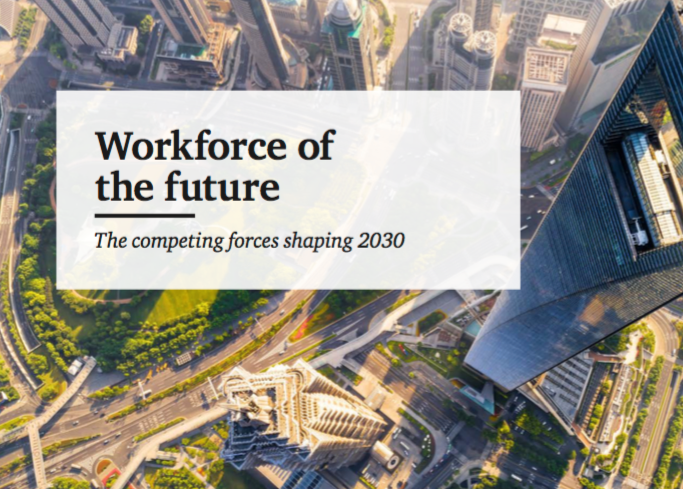A new report on the future of work draws on research begun in 2007 by a team from PwC and the James Martin Institute for Science and Civilisation at the Said Business School in Oxford and a specially commissioned survey of 10,000 people in China, India, Germany, the UK and the US. This has provided insights into how people think the workplace will evolve and how this will affect their employment prospects and future working lives.
The report looks forward to 2030 and asks how organisations can prepare for a future that few of us can define? How will your talent needs change? How can you attract, keep and motivate the people you need? And what does all this mean for HR?
It considers five major factors influencing the future:
- Technological breakthroughs – Rapid advances in technological innovation
- Demographic shifts – The changing size, distribution and age profile of the world’s population
- Rapid urbanisation – Significant increase in the world’s population moving to live in cities
- Shifts in global economic power – Power shifting between developed and developing countries
- Resource scarcity and climate change – Depleted fossil fuels, extreme weather, rising sea levels and water shortages
The report uses four scenarios to illustrate the kinds of changes we can expect:
- The Red World – Innovation rules
- The Blue World – Corporate is king
- The Green World – Companies care
- The Yellow World – Humans come first
It then highlights the people management challenges for each of these worlds. The Four Worlds of Work are each markedly different, but through each runs the vein of automation and the implications of robotics and AI. The report says “It’s clear that automation will result in a massive reclassification and rebalancing of work. Some sectors and roles, even entire sections of the workforce will lose out but others will be created. Automation will not only alter the types of jobs available but their number and perceived value. By replacing workers doing routine, methodical tasks, machines can amplify the comparative advantage of those workers with problem‐ solving, leadership, EQ (Emotional Intelligence), empathy and creativity skills.”
There are some clear messages for leaders included in the report.
“The future isn’t a fixed destination. Plan for a dynamic rather than a static future. You’ll need to recognise multiple and evolving scenarios. Make ‘no regrets’ moves that work with most scenarios – but you’ll need to make some ‘bets’ too.”
plus….
“Organisations can’t protect jobs which are made redundant by technology – but they do have a responsibility to their people. Protect people not jobs. Nurture agility, adaptability and re-skilling.”
and finally…
“A third of workers are anxious about the future and their job due to automation – an anxiety that kills confidence and the willingness to innovate. How your employees feel affects the business today – so start a mature conversation about the future.”

